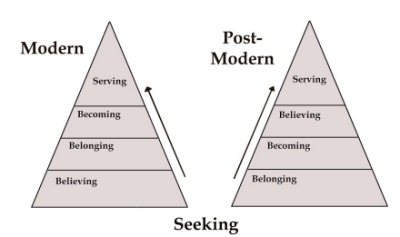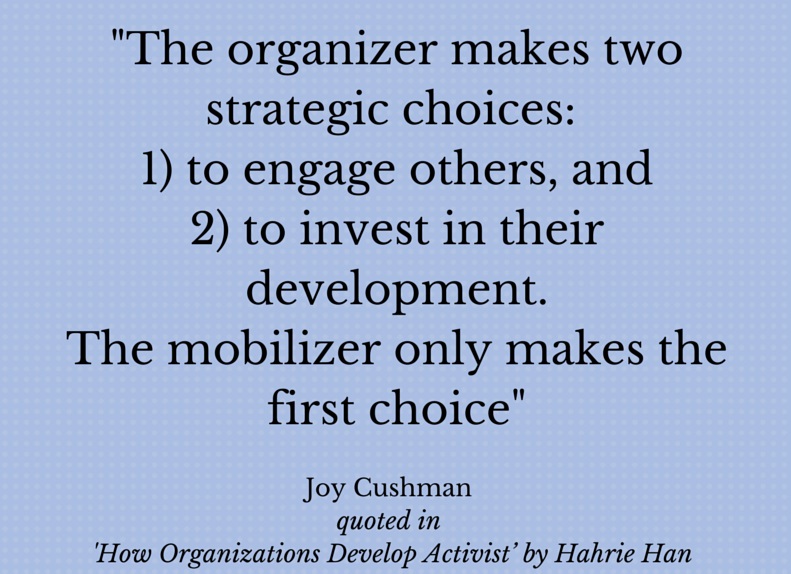Yesterday I had the opportunity to spend a day learning from US academic and trainer Hahrie Han on how we can organise activists. It was a cracking day alongside 50+ other campaigners, full of lots of thought provoking, challenging and inspiring content about how we can work to organise activists to deliver change.
It’s part of a series of events that Hahrie is doing while she’s here in London, this evening Hahrie is giving a lecture in conjunction with the University of Westminster. While the lecture is fully booked you can watch a free web stream of the lecture from 5.30pm today (31st March) here.
Walking away from the day I’m struck by a few lessons that I want to dig into more in my work.
1 – We need to get comfortable talking about transformation and power – Perhaps its our British reserve but because the word transformation seems to be associated with religious fever, while power is seen as a battle between good and evil, we don’t feel comfortable talking about them.
But as Hahrie suggested ‘movements build power not by selling people products they already want but instead by transforming what people think is possible’. We need to help people believe that transformation is possible and that starts by talking about it.
When it comes to power, we spent time considering the work of Steven Lukes and his Three Dimensions of Power. Lukes argues that power is exercised in three ways – visible, hidden and invisible.
Visible power is what we see happening in voting in elections or in Parliament – it’s perhaps the form of power that as campaigners we spend much of our time considering – how can we get MPs to vote for our issue in Parliament for example, but invisible power are the factors/beliefs/assumptions about how the world works that are often imbedded into our institutions.
Campaigners can spend lots of time talking about how we can overcome visible, but organising requires us to consider invisible power that prevents challenging the status quo. We need to spend more time talking about and wrestling with where power really is, and strategising on how we respond.
2 – Agency is about autonomy as well as competence – Agency is the ability to achieve purpose – and in most western countries individuals sense of agency is declining. We’ve often see increasing agency in those we work with as simply providing people with the skills they need – so they have competence to go out and make the change we’re looking for – perhaps because they’ve been trained to use a particular tool or approach.
Hahrie suggested that agency is not simply about make people feel they have the competence to use a tool it’s also providing them with the autonomy to use those tools – the space to act on it free from the control of an organisation.
3 – Good organisers are not always the first to put their hands up – Zack Exley one of Bernie Sanders lead organiser has spoken about ‘the tyranny of the annoying‘ when the worst people with the most time on their hands take over, and when it comes to picking organiser the same could be true.
Good organisers aren’t always those who are the first to volunteer, they can just be those with time to get involved, but instead individuals who have an ability to learn and reflect, are able to hold the juxtaposition between pain (the challenge of injustice) and redemption (hope that it can be overcome) and relational capacity.
4 – What brings you into belonging to a community – Growing up in a church community, I spent lots of my teenage years in debates about if becoming part of the church meant that you have to first believe then behave before you could belong. There is a growing conversation in church circles that actually the focus should be on belonging, and from that behaviour and belief will come. See below for more on this.

For many who come into activism the same is true. We often assume that people’s engagement in our issues comes first from a belief in our message and from that becomes the behaviours (like taking an action) and belonging (forming your support for an issue as part of your identity).
But evidence from pro-life activism in the US suggest it’s the other way around. Half of those who got involved in pro-life activism were indifferent to the issue when they first got involved, instead they did so because they were looking for community or invited by a friend. The belonging came well before the believing, are we creating activism spaces that encourage belonging?
5 – It’s not just about how profitable an organisation is – When it comes to metrics of success, we should take the same approach that financial analysts who don’t just judge the performance of a company in a given year on the profits they’ve made, but also the assets they have which inform their ability to make future profits for an investor.
Should the same be true of our approaches? Focusing on the wins achieved (the profit) but also the capacity going forward (the assets) which will inform the change we can deliver in the future.
There was lots of other insight wrapped up in the day, but I also walked away with some very practical reflections;
- We need to be finding our own community of academics and practitioners who are researching this – most of the literature that we covered was drawn from the US (and even then the body of work is fairly small). We need to find academics in the UK who want to dig into what’s working and not working here.
- It’s about mixing up and learning from different disciplines – Across the day we drew on insights from a range of approaches as wide as behaviour psychology to those teaching at business schools. Campaigners and organisers would do well to learn from across academic approaches.
For those who joined the skill share or the lecture, I’d be interested in learning what you’re thinking.
